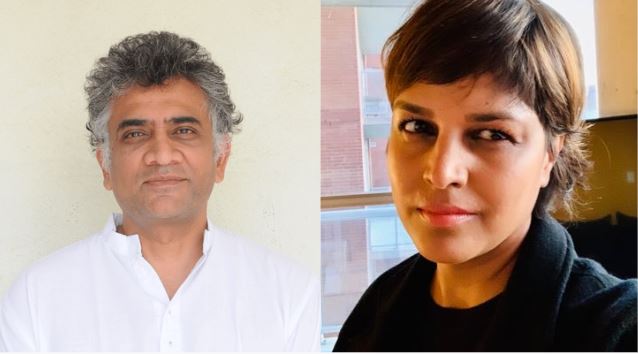As the Modi government announced nationwide lockdown for 21 days to prevent spread of Coronavirus, many people started panic buying in order to hoard ‘essential commodities’. After a few minutes of his address, PM tweeted that the adequate supply of the essential goods will be maintained till the lockdown, and the Ministry of Home Affairs also released notification that ration shops, medical shops, and media house will remain open, but people rushed to hoard food items.
A few ‘activists’ from the left liberal establishment like Aakar Patel and Rupa Subramanya tried to spread panic that India will be starved to death for the next few days. “So Indians will starve to death to beat Coronavirus. What a brilliant plan,” tweeted Subramanya, an economist who hobnobs with the people on both sides of the political spectrum.
So Indians will starve to death to beat Coronavirus. What a brilliant plan.
— Rupa Subramanya (@rupasubramanya) March 24, 2020
“What does 3 week lockdown mean? – Grocery shops closed? – Medicine shops open? – Petrol pumps open? – How does one get to hospital? – How do poor manage without food for 20 days? No detail. Only lecturing of virtue and spreading of panic,” tweeted Aakar Patel.
What does 3 week lockdown mean?
– Grocery shops closed?
– Medicine shops open?
– Petrol pumps open?
– How does one get to hospital?
– How do poor manage without food for 20 days?No detail. Only lecturing of virtue and spreading of panic.
— Aakar Patel (@Aakar__Patel) March 24, 2020
People in the left-liberal establishment were trying to peddle that India will have food shortage and the poor people would die of hunger if the country goes into prolonged slowdown. However, nothing could be further from the truth.
India has food surplus to support its entire population for the next few years even if the crop production is zero.
Food Corporation of India, the central government agency tasked to ensure food security, alone has 646 tonnes of food while the total food requirement to maintain supply till April 1 is 210 lakh tonnes. That means FCI alone could supply the food requirement of entire country for the next few years. Moreover, the state government agencies also have huge buffer stock of grains.
1अप्रैल 2020 तक PDS के माध्यम से दिए जाने वाले अनाज में चावल 135.8 लाख टन और गेहूं 74.6 लाख टन की आवश्यकता है। कुल 210.4 लाख टन अनाज की जरूरत है जबकि अभी हमारे पास कुल स्टॉक 646.09 लाख टन है। मतलब हमारे पास अनाज का 435.69 लाख टन अतिरिक्त स्टॉक मौजूद है। 1/3 @narendramodi
— Ram Vilas Paswan (@irvpaswan) March 18, 2020
The finance ministry has already announced that the states can take food on credit from FCI for the next three months. The finance ministry tweeted, “To ensure adequate supply of foodgrains to the public and financially assist the State Govts, Department of Expenditure, @FinMinIndia has agreed to the Food & Public Distribution Department’s proposal that foodgrain for 3 months can be lifted by States/ UTs on credit from FCI,” It further added, “This will ensure that the States do not face any cash constraint in distributing food to those in need.”
To ensure adequate supply of foodgrains to the public and financially assist the State Govts, Department of Expenditure, @FinMinIndia has agreed to the Food & Public Distribution Department's proposal that foodgrain for 3 months can be lifted by States/ UTs on credit from FCI.
— Nirmala Sitharaman Office (@nsitharamanoffc) March 23, 2020
Although almost all states have enough financial capacity to support the food credit for the next few months, but still in the case of emergency, the union government has opened the window for credit through FCI.
India distributes food at subsidized price under the National Food Security Act through various schemes like Mid Day Meal, Targeted Public Distribution System (TAPS), and Integrated Child Development Services (ICDS). Moreover, many states have their own food security schemes under which they distribute Rice, Wheat, Sugar, and Pulses at nominal prices like one or two rupees per kg.
The country has wide network of more than 5 lakh Fair Price Shops and more than 70 percent of the people of the country are covered under one or other subsidy scheme. However, the government must ensure that there are no inter-state restrictions on movement of food supplies.
In an article for Moneycontrol, Siraj Hussain retired as Union Agriculture Secretary, wrote, “The most serious threat to availability of foodstuff in India could come not from any shortage, but from an overzealous bureaucracy….There is an urgent need for the Centre to issue clear directions to the states that they should not impose any border restrictions on movement.”
Despite the lockdown, India is likely to produce a record 292 million tonnes of food grains in 2019-20. The Chairman of FCI reassured the country that there is no shortage of food in the country. “There is absolutely no need to worry as far as the availability of wheat and rice is concerned in any part of the country,” said D V Prasad, FCI chairman.
Therefore, all the concerns about Food Security can be put to rest. The liberals and leftist fear mongers must refrain from creating any panic among the people about food security, because in these abnormal times, the government could go to any length to protect the lives of citizens, and therefore, people like Aakar Patel could be put behind bars if they continue with fear mongering.
The economically secured middle class middle class must also refrain from hoarding essential supplies as this will lead to black marketing and poor citizens who could afford essential items will suffer until the government help comes. Therefore, everyone must buy the food and daily use items in a fashion they used to do before lockdown.

























